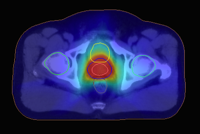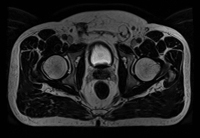Radiotherapy is one of the most common and most successful methods to treat cancer. At its core, it is the art of subjecting the tumor to high energetic photons that are delivered as radiation beams from different directions. In order for radiotherapy to be successful, it is crucial that radiation is delivered where it is intended, or the consequences for the patient will be devastating.
For the past decades computed tomography (CT) has been used as the primary image material from which the tumor is identified and delineated. While this is natural since CT contains the attenuation information required for calculating the radiation dose, it is suboptimal since the image contrast of CT does not allow for perfect tumor definition by itself. Instead, complementary images, or even qualified approximations, are required to determine the volume to irradiate.
Now, for the first time, the MRI Planner technology enables MRI to be used as primary images for radiotherapy treatment planning. The deep-learning based Transfer Function Estimation Algorithm (TFE) enables attenuation information to be synthesized from MR images only. Finally, the superior soft tissue contrast of MRI can be used for improved tumor definition, without the inaccuracies and costs associated with using multiple imaging modalities. With such MRI only radiotherapy planning, the doors are finally open for personalized and improved cancer treatment with fewer negative side effects.
For the past decades computed tomography (CT) has been used as the primary image material from which the tumor is identified and delineated. While this is natural since CT contains the attenuation information required for calculating the radiation dose, it is suboptimal since the image contrast of CT does not allow for perfect tumor definition by itself. Instead, complementary images, or even qualified approximations, are required to determine the volume to irradiate.
Now, for the first time, the MRI Planner technology enables MRI to be used as primary images for radiotherapy treatment planning. The deep-learning based Transfer Function Estimation Algorithm (TFE) enables attenuation information to be synthesized from MR images only. Finally, the superior soft tissue contrast of MRI can be used for improved tumor definition, without the inaccuracies and costs associated with using multiple imaging modalities. With such MRI only radiotherapy planning, the doors are finally open for personalized and improved cancer treatment with fewer negative side effects.

Synthetic CT with overlayed dose distribution for prostate radiotherapy

MRI of the prostate region
Redefining radiotherapy
MRI only radiotherapy planning


